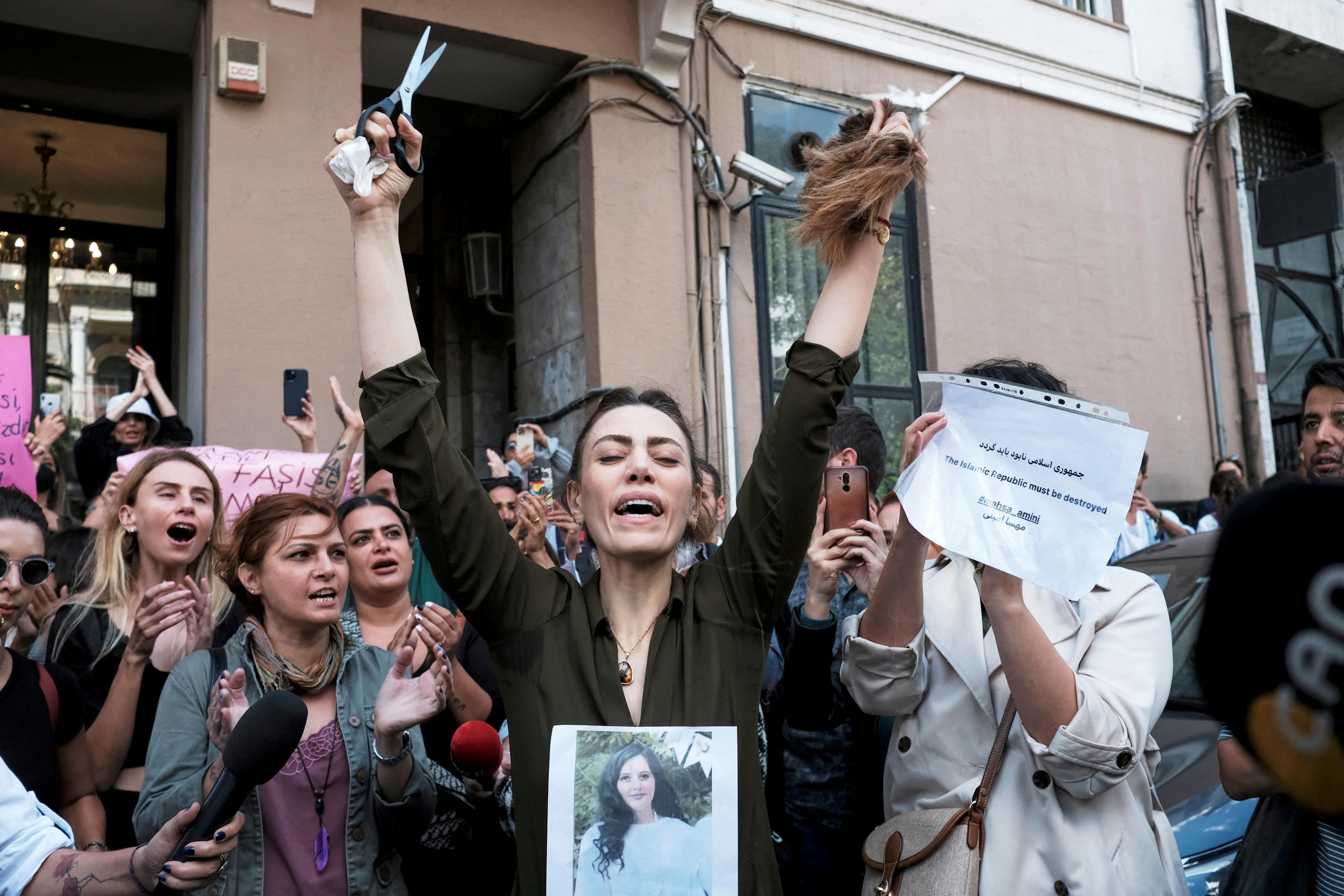What We're Watching: Iran protests spread, Putin mobilizes, NY sues Trumps, China faces slow growth
Iranian protests swell
Protests across Iran have now spread to 15 cities – and countries including Turkey, the US, and Germany – after a 22-year-old woman was apprehended and beaten to death by the Islamic Republic’s morality police. Mahsa Amini, from the western Kurdish region, was arrested in Tehran last week for failing to comply with the regime’s stringent hair-covering requirements. She died in custody last Friday. Women around the country have responded by burning their headscarves and cutting their hair in public displays of opposition to the oppressive treatment of women. What’s more, the hacker collective “Anonymous” has thrown its support behind the protests, which have led to at least three deaths and dozens of injuries. “Anonymous” says it hacked two government websites, including one focused on publishing government news (propaganda). Iranian officials claim the young woman died in custody from preexisting conditions and that it was investigating the case. But they also blamed foreign countries and opposition groups for the growing unrest. Meanwhile, Iran’s President Ebrahim Raisi heads back to Tehran on Thursday after addressing the UN General Assembly in New York. We’re watching to see whether the crackdown on protesters, the biggest since the 2009 Green Movement was violently quashed by Iranian forces, will intensify once Raisi is out of the international spotlight.
Putin’s mobilization and the response
On Wednesday, Vladimir Putin dramatically upped the ante, at least inside Russia, by ordering the partial mobilization of as many as 300,000 reservists for the war in Ukraine. (Full mobilization would extend beyond reservists to millions of ordinary citizens.) There’s a lot of fine print in Putin’s new plan, but here are the main takeaways. Ukrainians and their Western allies are not impressed. They know that it will take Russia months to train new soldiers, even those with previous combat experience, and there won’t be enough equipment for that number of new troops. Ukraine has signaled defiance, and Western leaders, including President Joe Biden at the UN on Wednesday, have made clear they will not ease pressure on Putin’s government or military. Russians, on the other hand, take this move very seriously. Hundreds, perhaps more, have already been arrested in protests across Russia, and there are new signs that yet another wave of draft-age men are looking for ways to leave Russia. (They better not be headed for Latvia.) Putin did not order the full mobilization that some feared during his televised speech. But given the news that the “special military operation” has suffered setbacks and the visibly hasty Kremlin response to Ukrainian advances, many Russians will (reasonably) worry that more men will be handed a rifle and pointed toward Ukraine in the not-too-distant future.
New York sues Trump for alleged fraud
New York Attorney General Letitia James on Wednesday filed a sweeping lawsuit against former President Donald Trump, three of his children – Ivanka, Don Jr., and Eric – and the Trump Organization for alleged fraud. The indictment claims that over the course of a decade, the Trumps mischaracterized property values (inflating some while undervaluing others) to deceive lenders, secure better loans, and gain tax benefits. The civil suit alleges that the organization misled insurance brokers and tax authorities, and James is seeking $250 million in back payments from the Trumps. If she prevails, the family could be banned from helming businesses, acquiring commercial real estate, and securing loans from accredited financial institutions in the Empire State. Moreover, James referred the case to the US Justice Department and the IRS to investigate possible criminal violations of federal law. The former president’s lawyer dismissed the case as politically motivated. This latest legal problem comes as Teflon Don faces a string of other civil and criminal cases that could derail his future political ambitions.
China’s growth woes
For the first time in more than 30 years, China’s annual economic growth will be more sluggish than the average growth of emerging Asian economies, according to the Asian Development Bank. China’s economy is now slated to grow by 3.3% in 2022, down from a 4% forecast in July and the 5% predicted earlier this year. China’s economy is on a downward trajectory largely due to President Xi Jinping’s restrictive zero-COVID policy that’s hamstrung industries as well as a real-estate slump. Meanwhile, emerging Asian markets – a group including Vietnam, Thailand, Malaysia, and Indonesia but not China – are slated to grow by 4.3% in 2022. Still, that’s slightly down from July’s prediction of 4.6% as many of these export-reliant economies are trying to balance inflation-mitigation efforts with growth goals. What’s more, many Asian countries, including China, are feeling the pinch as global demand has weakened amid tightening monetary policies in the US and Europe. This is yet more embarrassing news for Xi, who previously insisted that China is still on track to meet a growth target of 5.5% despite economic indicators to the contrary. Will it force Xi to relax the zero-COVID policy after next month’s Party Congress, where he is vying to secure a norm-defying third term as CCP secretary-general?
This article comes to you from the Signal newsletter team of GZERO Media. Sign up today.
